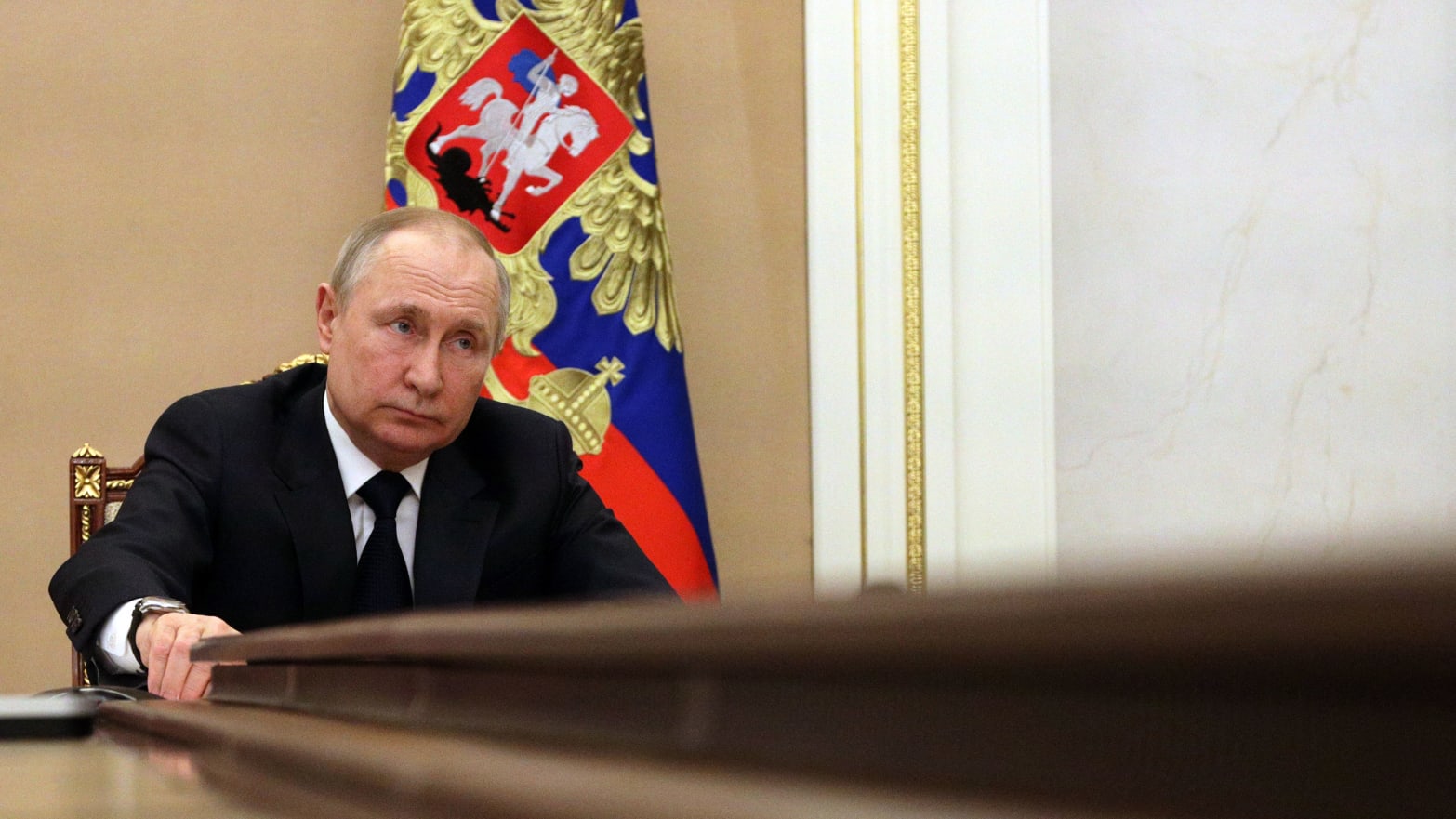The Kremlin may be canceling Russian President Vladimir Putin’s major annual press conference for the first time in ten years, a move that comes on the heels of a crushing Russian withdrawal from the city of Kherson in Ukraine.
Two sources familiar with the situation reportedly told Russian news outlet RBC that the president's big press conference, which has been taking place since 2012, may not take place at all this year, adding that the usual preparations for the event “are not yet underway.” One of those sources went so far as to confirm that the “situation” Russian forces are dealing with in Ukraine would play a factor in the decision.
“We do not rule out any options. So far no final decision has been made,” Kremlin spokesperson Dmitri Peskov told RBC in response to an inquiry. “We will keep you informed as the President decides on the schedule.”
It wouldn’t be the first time Putin has retreated from the public eye during the war in Ukraine. In September, when Ukrainian forces seized territory from Russia that Moscow had taken early in the war, the Russian president postponed a key meeting with his top military representatives.
The news comes just days after Russian forces fled from Kherson, which Russia had held since the early days of the invasion. It was the only Russian foothold west of the Dnieper River, and without it, Russia is deprived of a key territory that could serve as a launchpad for invasion into other regions in Ukraine.
Other efforts to recover from the defeat emerged from Moscow on Monday. A series of headlines in Russian state-owned media Monday pushed the narrative that Western leaders are ready for peace and negotiations, including Ukrainian President Volodymyr Zelensky himself.
It appears to be the latest attempt from Russia to amplify the idea that the western world may be prepared to negotiate with Vladimir Putin while his forces lose momentum in the war, while glossing over the reality that Ukraine still sees a path forward to a victory on the battlefield.
One headline at TASS, a state-owned media outlet, touts “Ukraine ready for peace, Zelensky says.”
“We are ready for peace, peace for all our country,” Zelensky said in Kherson, a city that Ukraine just liberated from Russian forces. Russia had occupied the city since early this year.
But Zelensky isn’t necessarily ready for a sit-down negotiation—the Ukrainian government still has its sights set on more battlefield wins and kicking Russian forces out of all of Ukraine.
“We do everything to make the enemy feel our retaliation. To the maximum,” Zelensky said in a Sunday address, which the TASS article does not cite. “Along the entire frontline, we ensure the destruction of enemy supply chains, ammunition depots, and enemy headquarters.”
TASS also noted in another article, highlighted on its homepage, that French President Emmanuel Macron is pushing for negotiations as well.
“I think more diplomatic efforts are needed in the next few weeks to bring the sides to the negotiating table,” Macron told France Inter radio, TASS reported.
Another article headline on the TASS homepage highlights: “Talks on Ukraine possible after Russian troop pullout, says Finnish top diplomat.”
Macron and the diplomat, Finnish Minister for Foreign Affairs Pekka Haavisto, also emphasized, however, that there should only be negotiations with Russia if and when Ukraine wants them.
Negotiations should happen “at such a time and on terms that Ukrainian President Volodymyr Zelensky and the people of Ukraine find acceptable,” Macron said.
Russian state media’s sudden focus on world leaders seemingly rallying behind the idea of negotiations could be an indication that Putin and his cronies are becoming increasingly desperate to bring any wins back home after recognizing that their war plans have been dashed.
President Joe Biden on Monday expressed optimism that Russia will not be able to achieve many of Putin’s war aims.
“I’m confident that Russia will not occupy or defend Ukraine as they intended from the beginning,” Biden told reporters in Bali on Monday on the sidelines of the G20 meeting, adding that the U.S. is “not going to engage in any negotiation.”
The coming winter may also pose some challenges to Russia’s attempts to seize territory in Ukraine and lead to a slowdown in the war, according to Biden.
“You will see things slowed down a bit because of the winter months and the inability to move as easily around the country,” Biden said.
Russian morale is also likely to dip, according to the intelligence analysis.
“The weather itself is likely to see an increase in rainfall, wind speed and snowfall. Each of these will provide additional challenges to the already low morale of Russian forces, but also present problems for kit maintenance,” the analysis reads.
As the thinking goes, if Russia can stop the fighting through negotiation before winter sets in, it could try to maintain what few gains it has made.
In the meantime, Russia still is working to gain ground in Donetsk, according to the Zelensky administration. “It’s just hell there. There are extremely brutal battles there every day,” Zelensky said in a speech Saturday.
On Monday, Putin issued a decree that would allow Russians with foreign citizenship to be drafted into the war, in a possible signal that Russia is looking to bolster its armed forces numbers.
Although Russia is working to build momentum in Donetsk, it’s unlikely to be able to fend off Ukrainian advances.
“The [Ukrainian Armed Forces] has been grinding forward nevertheless, and there is no reason to forecast that the ill-trained, ill-equipped, and low-morale Russian reservists will be able to stop Ukrainian troops, buoyed by their victories, from advancing,” the Institute for the Study of War said.

